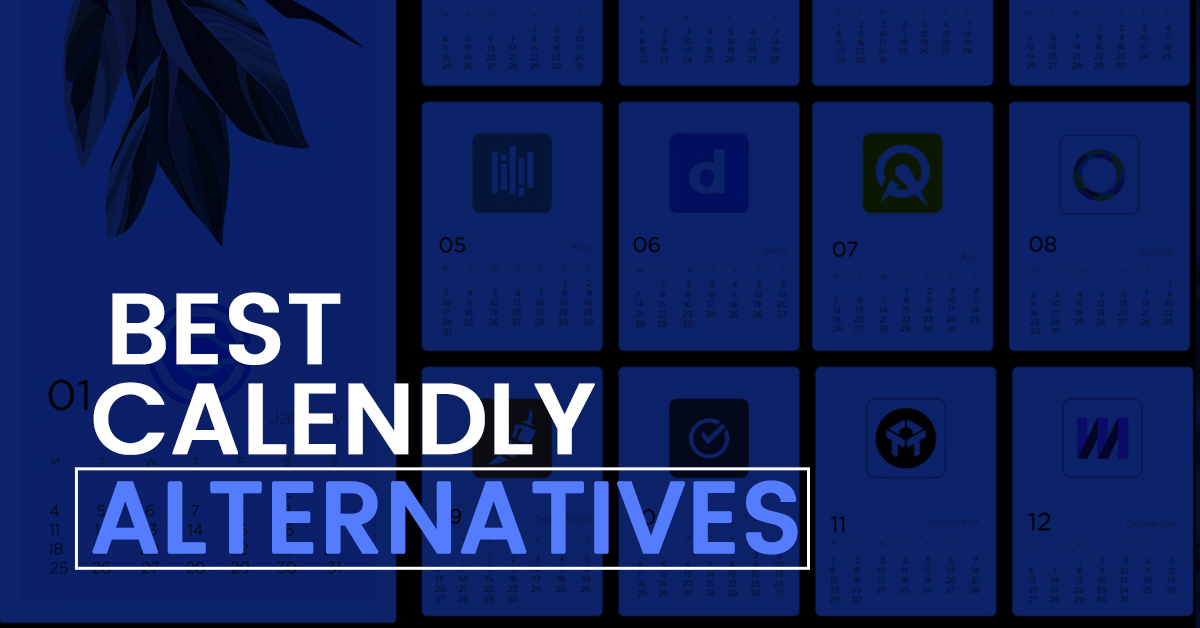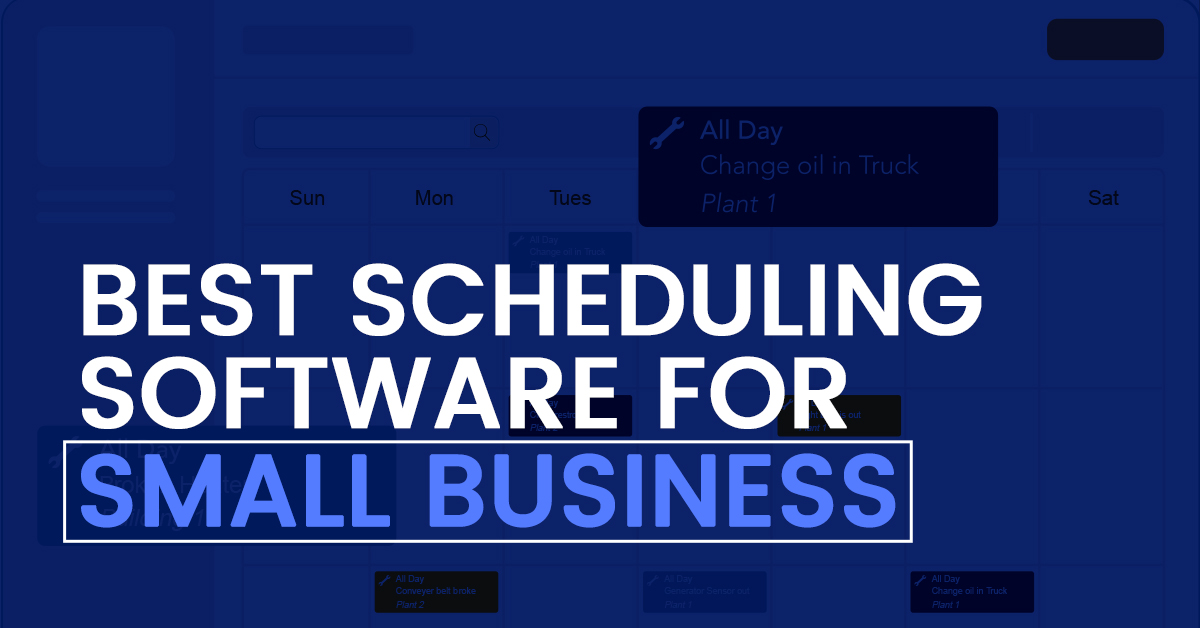
7 Top Calendly Alternatives & Competitors 2024
Want some calendy alternatives? we have got a curated list for you. Regarding keeping track of your schedule, there are a few tools as versatile
Home » Facility

Want some calendy alternatives? we have got a curated list for you. Regarding keeping track of your schedule, there are a few tools as versatile

Trying to organize everything on paper or in a spreadsheet can be hard and it can be easy to lose track. Scheduling software can help
Facility software which is also referred as facility management software is an invaluable tool for businesses that need to manage their buildings and equipment. This type of software automates many of the processes involved in day-to-day operations, providing data-driven insights into maintenance costs and performance. It also helps facilities management teams make informed decisions with real-time data.
Facility software comes in a variety of forms, allowing you to find the perfect solution for your needs. Here are four major types of facility software popularly used by facility managers.
CMMS provides real-time data and insights into your facility’s assets and preventive maintenance costs. With a CMMS, facility managers are able to track and manage maintenance tasks, inventory, labor costs and other related activities.
The system provides a comprehensive view of the entire maintenance process, from scheduling preventive maintenance to tracking repair requests and ensuring compliance with safety regulations.
IWMS enables users to manage all aspects of their facility from one convenient location. It provides a centralized platform for managing all aspects of your facility, including space management, operations, maintenance and capital. IWMS is particularly useful for facility managers who intend to manage multiple aspects of their facility in real time while reducing operating costs and increasing efficiency simultaneously.
CAFM is enabled for tracking and management of assets, maintenance requests, service orders and other aspects of a facility. CAFM are used in tracking space utilization, managing events and generating reports. It also helps in analyzing energy consumption and scheduling preventive maintenance tasks.
Asset management platforms allow you to track the entire lifecycle of your assets, ensuring that they are properly maintained and up to date with the latest regulations.
With so many options available, it is important to choose the right type of facility software for your organization – one that meets your specific needs and helps you get the most out of your day-to-day operations.
Facility software offer ranges of benefits to facility management teams during day-to-day operations.
Facility software is an invaluable asset for any facility management team looking to maximize their productivity and get the most out of their operations.
Facility software provides a comprehensive range of features designed to help facilities teams better manage their resources. Below are some features, which are essential in making the decision to choose a facility software.
| Features | Description |
| Asset Management | Enables managers to monitor asset lifecycles and optimize asset performance for maximum productivity. |
| Work Order Management | Provides real time updates on work order and progress from a single location, bringing ease to duty and service allotment. |
| Energy Management | Enables organizations to track their energy usage, with the provision of insights to achieve efficient energy optimisation. |
| Space Management | Helps managers optimize space usage, plan for future needs, and track occupancy for compliance purposes. |
| Maintenance Management | Facility software such as the CMMS includes features for managing maintenance tasks, such as work orders, preventive maintenance schedules, and asset inspections in compliance with recent regulations. |
The Cost of Facility Software
The cost of facility software depends on a variety of factors, such as the size and complexity of the organization, the type of features needed, and the number of users.
Generally, most facility software solutions come with a one-time setup fee, as well as an annual subscription or license. While some others allow monthly subscription after a one-time setup fee.
Prices can range from just a few hundred dollars to several thousand per year. The cost of facility software also includes costs associated with training new users and maintenance fees for any updates or bug fixes. Some common additional factors such as customization, integration, maintenance cost also vary the cost of facility software for each facility.
For larger organizations, these costs can add up quickly. However, the long-term benefits that come with having an integrated facility management system in place often outweighs the initial cost.
Facility software products are becoming increasingly popular among organizations as they provide valuable insight into day-to-day operations. We shall now consider some popular facility software products, their pricing cost and features to assist you in the selection of your preferred facility software.
eMaint provides users with an asset reliability platform which helps organizations increase uptime with a seamless integration of maintenance tools and software solutions. The software also provides flexible and configurable interface to accommodate dynamic needs of industries.
Hippo CMMS provides users with easy to read reports and asset tracking to give insights for improvement. The software also supports a central database to keep all members of the team within a loop for easy data tracking and possess an automated preventive maintenance scheduling
Top-rated facility software available on Android and App Store. Ranked the best for maintenance and operations across third-party review sites. The software supports seamless integration with other services and products while providing enterprise-grade security for data protection
FMS system provides a wide range of products for asset management, space management. The software has gathered numerous awards to its pedestals over the years.
UpKeep CMMS provides users with a facility software which possesses comprehensive Enterprise Asset Management (EAM) capabilities. The software also features a centralized work order request system as well as a powerful preventive maintenance program.
All in One solution for facility management and optimization. Providing a wide range of features that supports facility inspections, capital management, work order management and preventive maintenance among many others.
Facility software integrations are becoming increasingly important in managing day-to-day operations. Integrating other software with facility software allows management teams’ access to the data they need to make more decisions that are informed. Some essential integrations are discussed below:
While facility software essentially provides essential services related to facilities or assets, It may not provide adequate accounting services. These integrations are manifested in automated billing, budget tracking, purchase order tracking or asset depreciation.
Facility software can integrate with BAS systems to provide real-time data on energy usage, Heating, ventilation, and air conditioning (HVAC) performance, and other building systems. This allows organizations to optimize their energy consumption and reduce costs.
Facility software integrations provide organizations with the ability to track assets and manage costs in real-time. Additionally, by linking facility software products together organizations can uncover workflow issues and address them quickly. Integrating facility software products also helps improve communication between departments, making it easier for organizations to streamline their processes and reduce operational costs.
Facility software is designed to help manage day-to-day operations for businesses, but it can come with its own set of problems.
Recent years have seen a considerable rise in facility management software. From preventive maintenance, to cost reduction and data-driven insights – these solutions have become invaluable tools for facilities teams.
More and more facility management software now pose to offer cloud-based solution, allowing for easier access and real-time collaboration across devices. This has improved teamwork and duty simulations.
Facility management software now integrate with IoT devices to provide real-time data on energy usage, occupancy, and equipment performance, enabling better decision making.
Facility software providers now offer mobile apps that enable the management team to access and manage facility data on the go. This grants users a sense of control at all times.
AI-powered solutions are now being developed to help facility managers predict equipment failures and optimize energy consumption, among other things.
Facility management software now incorporates advanced data analytics capabilities to provide insights into facility performance, enabling better decision-making and proactive maintenance.
Sometimes, to achieve maximum efficiency of a facility software, other softwares or services may be required for integration. Below are some services or softwares that can be used to enhance efficiency of facility softwares.
ERP software helps in data processing operations providing each department with full control and visibility over all areas of operations. Popular ones include SAP, Cegid Primavera, PHC.
Finance departments also require tools to help cut hours spent running manual calculations on discounts and updating spreadsheets. Some world class accounting softwares that may enhance efficiency of facility software includes FreshBooks, Quickbooks Xero, Zoho Invoice among many others.
Facility software requires data analytics tools to provide data driven insights to end users. Some popular and efficient data analytics tools include Power BI, Nous.io, Tableau